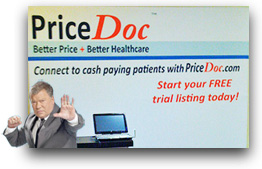 Actually, William Shatner has nothing to do with dentistry. And that’s a good thing.
Actually, William Shatner has nothing to do with dentistry. And that’s a good thing.
The familiarity with Priceline’s marketing is a good place to start, though. Mix in a few thousand medical and dental professionals who are willing to try a similar technique to improve their new patient flow and you’ve got a website called PriceDoc.
For an average of about $50 per month for a spot on the PriceDoc website, you can give percentage discounts, allow patients to negotiate for prices, or simply state your fee for specific procedures. Like a porcelain crown. Can you imagine someone on the internet seeing that your crown fee is less than the other dentist down the street, and then coming to you instead, and paying cash?
Or if you put the shoe on the other foot, have you tried shopping for that gall bladder surgery that you’ve been needing for a while?
PriceDoc went national about six months ago, and has yet to post any impressive procedure price wars between healthcare providers. There’s also no way to know if a dentist is as good as they say they are on their advertisement, so it’s difficult to predict whether or not this type of marketing will appeal to those dentists who value quality care over production quotas. Currently the only requirement for setting up a provider account is a credit card.
It’s a great idea in concept, especially for patients without insurance and dentists that prefer consumer-driven care instead of insurance-dictated treatment. If enough healers are ready to take a leap of faith, PriceDoc may become a force that changes healthcare forever.
__________
In the meantime, consumers already have the ability to price out the average cost of many common dental procedures without having to compare dentists’ fees directly. The website Healthcare Blue Book offers suggestions based on a patient’s zip code, and even recommends taking a printout of the “fair cash price” to your office when an estimate is presented for anticipated dental work. Blue Book prices are generally above standard insurance contract rates, and considered fair compensation for cash-paying patients.
Patients should probably be glad, though, that dentists can’t use the Blue Book in reverse to judge the condition of a person’s mouth beforehand.
![]()